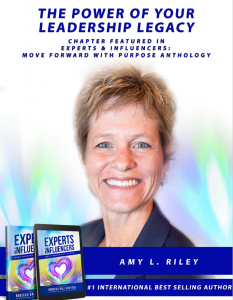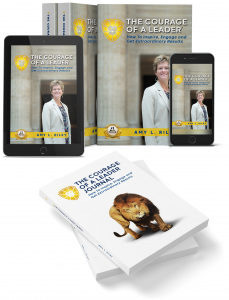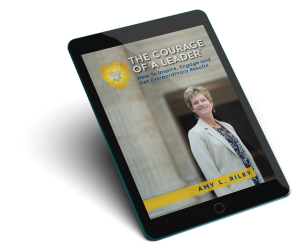Sherry Haworth, President at PLICO, asked all employees to try out a hybrid approach. What many learned surprised them, and they are continuing to evolve their approach. Hear their story – and effective hybrid approaches – in this episode.
About the Guest:
Sherry Haworth is the President of PLICO, a medical professional liability insurance company located in Oklahoma City. She began her career in Human Resources and, driven by a people-oriented perspective, was able to successfully shift to Operations Leadership. Sherry believes in the importance of recognizing that there isn’t a single business decision that doesn’t have a people impact. Once you can articulate what that impact will be, you are best poised to make the right decisions for the organization and its stakeholders.
About the Host:
Amy L. Riley is an internationally renowned speaker, author and consultant. She has over 2 decades of experience developing leaders at all levels. Her clients include Cisco Systems, Deloitte and Barclays.
As a trusted leadership coach and consultant, Amy has worked with hundreds of leaders one-on-one, and thousands more as part of a group, to fully step into their leadership, create amazing teams and achieve extraordinary results.
Amy’s most popular keynote speeches are:
The Courage of a Leader: The Power of a Leadership Legacy
The Courage of a Leader: Create a Competitive Advantage with Sustainable, Results-Producing Cross-System Collaboration
The Courage of a Leader: Accelerate Trust with Your Team, Customers and Community
The Courage of a Leader: How to Build a Happy and Successful Hybrid Team
Her new book is a #1 international best-seller and is entitled, The Courage of a Leader: How to Inspire, Engage and Get Extraordinary Results.
https://www.linkedin.com/in/amyshoopriley/
Call to action
Want help determining and designing your optimal hybrid approach? Download Amy’s free eBook: How to Build a Happy and Successful Hybrid Team and Become 10 Times More Productive here: https://courageofaleader.com/products/#how-to-build-a-happy-and-successful-hybrid-team
Thanks for listening!
Thanks so much for listening to The Courage of a Leader podcast! If you got inspired and/or got valuable leadership techniques you can use from this episode and think that others could benefit from listening, please share using the social media buttons on this page. Do you have questions or feedback about this episode? Leave a comment in the section below!
Subscribe to the podcast
If you would like to get automatic updates of new The Courage of a Leader podcast episodes, you can subscribe to the podcast on Apple Podcasts or Stitcher. You can also subscribe in your favorite podcast app.
Leave us an Apple Podcasts review
Ratings and reviews from our listeners are extremely valuable to us and greatly appreciated. They help our podcast rank higher on Apple Podcasts, which helps us ignite The Courage of a Leader in more leaders! Please take a minute and leave an honest review on Apple Podcasts.
Teaser for next episode
The next episode of The Courage of a Leader podcast is: How to Think Like the Best Top-Level Leaders with Joey Vitale, Business Growth Expert
Transcript
Sherry Haworth president at PLICO, a MedPro group asked all employees to try a hybrid approach to work, what many learned surprise them and they're continuing to experiment, hear their story, and effective hybrid work approaches in this episode
Amy Riley:Welcome to the Courage of a Leader podcast. This is where you hear real life stories of top leaders achieving extraordinary results. And you get practical advice and techniques, you can immediately apply for your own success. This is where you will get inspired. And take bold, courageous action. I am so glad you can join us. I'm your host, Amy Riley. Now, are you ready to step into the full power of your leadership and achieve the results you care about most? Let's ignite the Courage of a Leader.
Amy Riley:Sherry tell us what is the current work approach at piko? Is it hybrid? What's it looking like today?
Sherry Haworth:to the office last October of:Amy Riley:Okay, got it. Yeah, that's terrific. I've heard a number of folks say like, Hey, we're back in the office a number of days a week. But I'll go into the office, and none of the people that I need to talk to are there, they haven't selected the same day. So I think there is something to be said there for some coordination of what is going to be a common day. That will all come in the office.
Sherry Haworth:And I think I think we will move to having a second day. So I think that that's that's kind of in the works. Our plan is to move to that second day. Probably the Tuesday
Amy Riley:see why Sherry like what, what has what's leading to that decision.
Sherry Haworth:I think that it's recognizing that one day a week. Is isn't enough, isn't quite enough in terms of, especially in the beginning, people get back and they're really excited to see one another and so you have a lot of socialization that happening along with work. And so adding that second day still allows for a lot of flexibility but gives more focused concentration, I guess on work to be scheduled around collaborative type days. So it's almost repurposing your office. I don't, I don't know if you know, we ever saw our physical office as having any kind of, of meaning or any, you know, anything that we attributed to it other than it was the space in which we worked. So now I think your office has to have some kind of purpose. And, and maybe those purposeful office days are spent in ways that are different than what they were before. Because you, you know, before any moment in the office during the week could be a collaborative moment. Now, we have to be a lot more intentional, intentional about having those collaborative moments. And, you know, making them more scheduled, I guess, for lack of a better word.
Amy Riley:Collaborative moments on Wednesdays.
Sherry Haworth:Well, those are the best. That's the day that is most ripe for collaborative moments, right.
Amy Riley:Yeah, yeah. So are Wednesday starting to feel full? Yes, let me office. Okay. That's why all right. This is this needs to creep into another collective in office. Yeah.
Sherry Haworth:So it feels almost like it did prior to, you know, Corona, you, everybody's in the office. And you have people milling about and running into other people in the hallways or into the, you know, the common spaces and, and re engaging in relationships that have been put on pause for a few years. Yeah, really? Realistically? Yeah.
Amy Riley:Okay, I've got more to ask you about this. But I want to tell everybody, that today I am speaking with Sherry Hayworth. She's the president of piko, which is a medical professional liability insurance company. As she said, located in Oklahoma City. Sherry began her career in human resources, and driven by a people oriented perspective, was able to successfully shift to operations leadership. Well, Sherry, I love when, when senior leaders when our presidents that have a background in HR, Sherry believes in the importance of recognizing that there isn't a single business decision that doesn't have a people impact. Once you can articulate what that impact will be, you are best poised to make the right decisions for the organization and its stakeholders. Well said, Sherry, and thank you for being here today.
Sherry Haworth:Well, thank you. Thank you for having me. Yeah.
Amy Riley:So I know, every organization, the story's going to be different. But I like for piko how this started out, we're going to have one collective in office day. And now people have been experiencing that. They've been scheduling what they're scheduling on Wednesday, and you are learning organically. We need another one of those or more we need more whether another morning or another full day. Yeah. Because if we're going to ask employees to come back into the office, they need to know why they should be
Sherry Haworth:worth their benefit. Oh, go ahead. It has to be worth their time, their effort.
Amy Riley:Yeah, well, like you said, the office has to have a purpose. Right? Because employees proved that they in many, many, many industries, that they can do their work from home. Right? Yeah. So why don't why do I need to make the effort to put on real pants and come in
Sherry Haworth:I think it's all about capturing what you didn't realize that you had before. Recognizing the importance, you know, just in your in your own career development, your own experiential development, in terms of the work that you do, that people from other backgrounds with other skill sets, and other areas of extra expertise, the more I collaborate with them, or the more exposure I have to them and their perspective, and their perspective on the customer their perspective on the work their perspective on a on a policy or a process. It helps me be better at my job. And it's difficult to articulate that and it's you can it's I haven't found a way in which you can measure it.
Amy Riley:Mm hmm. Yeah.
Sherry Haworth:So the work that's been there is absolutely work that's being done at home and people are able to perform and maybe even at higher levels at home, because you've eliminated some distractions. And but the work at home can be very task oriented, very independent type work. But we know that there's also, there's also some some work that comes in the door, that if you had a handful of people around you, that you were able to have a quick conversation with, in the moment that you could have that work that completes that work in a, in a faster, shorter amount of time. And with a better result, potentially,
Amy Riley:yes. I like what you're saying here, because this is, this is not only what employees want in need, I mean, it's also what teams and your colleagues want needed. And it's also what the work needs needs to be done exceptionally well. And we know that there's work that benefits from in person ideation, checking for other perspectives, building on each other's ideas, old just gonna, you know, pop my head over and see so and so and get their input on this, rather than having to chat back and forth and get arranged three days later. Right. It's it's not only what employees want, because we've experienced this benefit of working from our homes, but it's also what works for, for the for the work and to satisfy your customers need to have important customers,
Sherry Haworth:it's interesting that you say it's what employees need. Because I did find that with some employees that they didn't necessarily recognize that they needed it until they returned back into the office, I had several who really, you know, they, they, they really liked working from home full time, and it was working well for them. And there were things about it that, you know, gave them a lot of freedom, a lot of flexibility that they didn't have before in the old environment. And so then when you ask them to come back to the office, we did get some pushback, we did get, you know, some requests to work from home full time. And, you know, in my request was, let's give it a try. Let's come back two days a week. And see, give it several months, because we knew what it was like working in the office five days a week. And we knew what it looked like working completely remote five days a week. But what we didn't know was what a hybrid environment would look and feel like for, for those involved. And almost to a person, the feedback that I got from employees after their first day back in the office was I really didn't want to come back to the office. But I, I'm so glad I did I recognize I do need this.
Amy Riley:Mm hmm. I love that you invited folks to give it a try. Right? Because that's absolutely right. And this is all it's an overused word. But it is really all unprecedented. And you said it really, really well. And we're getting used to new rhythms in our lives. And yes, there's things that we're really enjoying about work from home. But we don't know, like going back to, you know, a couple of days in the office a week, what will that look and feel like, and I know, you've also had your eye on folks that are newer in their career, knew to accompany your company. And, you know, they might not have known what that experience was of working in the office five days a week. So really no exposure to what might be the unexpected benefits to having time in the office.
Sherry Haworth:Right. Right, and building those relationships. I do think so much of our success and our work is reliant upon the relationships that we've built, whether it's internally or externally, and and how those relationships those dynamics, you know, cross that border between internal and external.
Amy Riley:Yeah, yeah. I really think that for many organizations, this, let's give something a try. Might be a really effective approach and then you can evolve and shift into what is ideally going to work and maybe this is Something that continues to shift over the life cycle of an organization?
Sherry Haworth:Well, I think it does, because I think everybody's need, or their definition of flexibility is different for each individual and for each stage of life or stage of career. Yeah, you know, what I needed in terms of flexibility in my work, and, and home looked different for me 10 years ago, or even five years ago than it does today. And then I think in the next three years, again, my life will shift. And the idea of flexibility won't match. You know, what works for me today? Yes, yeah. So I think
Amy Riley:lots of the phases of life of each right, individual employee,
Sherry Haworth:and recognize it. So a one size fits all approach isn't the answer. Because if the idea is to, to help support the employee, and to give them the flexibility that they crave, they desire they need, you know, a one size fits all approach isn't going to meet that criteria.
Amy Riley:Right? Well, I think this is just going to become another variable, another dynamic when you've got an employer seeking new employees, and you've got candidates seeking work, part of cultural job skill set fit is going to be what is that work model? Right, that work from home? Is it 100%? In Is it is it hybrid? Is it you get to decide? And that's going to have become another variable?
Sherry Haworth:When you have a little bit of all of them? Right?
Amy Riley:Yeah, I'm certainly hearing about a wide mix. And people will ask me for my advice, and it's really everybody's got to figure it out. My advice is, get the experiences drum up the data. Right? How's it? How's it working for folks? What do individuals need? What does buddy teams need? What does the work need? And intentionally think about all of that, and CO create, with with your employees right now, you all are experiencing collaborative Wednesdays and making up a title there? A reason the office on Wednesdays right? And you're having that experience? And you're filling up that day, and you are collectively realizing we need more time when everyone's in the office?
Sherry Haworth:A little bit more time to see
Amy Riley:what are the we talked about some of the benefits? What are the challenges that you see on going Sherry,
Sherry Haworth:I think the biggest challenge that we have is cross functional collaboration, really, and truly, I, I do believe that managers, teams have done a very good job finding ways in hybrid world and the remote world and in the in person world to connect to each other to talk about the work to strategize to implement strategies. But the place that I feel the biggest gap is with the cross functional, if I don't have a need a specific need to reach out to a teammate on another team. You know, do I do that, if I have a need is is the is the communication? Not as not as complete, as it might have been had that communication taken place in a different form. So, for instance, you know, we're all I think, most humans qn, to body language to certain things that aren't said or were when I have a dialogue with you. My intent may be to cover one thing, but there might be something said either on my part, or your part, that we go down, you know, this, this rabbit trail people call them, but they're, oftentimes you find that there's benefit to having some of those side conversations because you learn something that you wouldn't necessarily have set a meeting up to, you know, to receive that information. Or it doesn't come up in the course of the discussion on a particular topic. So how do you have how do we do a better job of cross collaboration across functional lines? And that's that's the biggest challenge.
Amy Riley:Yeah, yeah. I I think that's really wise to, to notice that and, yeah, the situation where someone might have the best of intentions, right to keep people up to date. And I'm collaborative. I'm a good team player, you know, I want my colleagues to know, I want my company to do well, overall. but honest to goodness, you know, our plates are full, we're working on something. So if there's not an immediate need for another group to know, or another group to take action, we might not think to include them right? In in the moment. And if we're isolated at home, it's easier to forget that.
Sherry Haworth:Yeah, and when you're isolated at home, it's easier to to see to be a silo. Yeah. Right. Okay, I'm only going to take in this information or deal with this particular issue as it pertains to the work that I'm doing. But I may not because I'm not seeing my colleague every day, I may not think to, you know, give them a heads up on hey, you know, this happened with with this customer, because there was nothing I needed from them or, you know, it didn't it didn't involve that particular side of the organization. And it's, it's, it's those little conversations that you have that you, again, you can't measure them and you you can't pinpoint exactly how they may come about. But the information that's shared in at the watercooler is pertinent information to me being able to be as effective in my role as I possibly can.
Amy Riley:Yeah, yeah. Yeah, at some point, but this is a lagging measure, you know, would be if a decision was made and didn't include needed perspectives, right. So it didn't work in some in some way. Anything that you were the leaders and piko have been trying to foster that cross functional collaboration?
Sherry Haworth:I don't know if we've done any effect. That it's all, you know, it's a bit trial and error. Right. I think one thing that now I think moving forward, you know, we'll, we'll have a divisional meeting. And we'll, we'll have people that are in person, and we'll have people who are attending remote. And I do think that it is important to have a, so if if you're facilitating the meeting, it may be important for you to have a designated moderator for the technical aspect of that particular meeting. So somebody who can, you know, see the questions that are being brought up in chat, or engaging in managing breakout sessions or being the person to post if you're doing an internal poll or sharing a document, just ensuring that the, that those who are attending remote are, are being woven into, you know, the the live discussion by hand, we I found that me trying, if I'm facilitating the meeting, me trying to be the facilitator, and that, you know, remote catch all individual is a lot gets lost,
Amy Riley:what I'm hearing sharing, not only from helping to manage the tech nology and making sure we're seeing what's coming in the chat, maybe also like moderating, like, Okay, this question is coming from this area, organization, okay, here's a question or a comment, or input that's coming from a different perspective, you, making sure that's being included,
Sherry Haworth:right, so that everybody has that opportunity to engage? And I think that they are more likely to engage if they're remote and dialing in to this particular meeting, if they know that the comment is going to be or the question is going to be seen and acknowledged and, and, and woven into the fabric of the meeting. So that's important getting getting better at being able to have an even even playing field. You know, I hear that a lot in that respect, and I don't think that the answer has to be well, now we have to have everybody dial in remotely for every meeting. So I think that there are ways that you can still have that hybrid approach. And, and keep the the end people in person individuals engaged as well as the people you know, who are remote will
Amy Riley:be happening more and more. So How do we make good meetings? work that way?
Sherry Haworth:Right. Right. And technology is such a huge piece, you know, I think that we have been a little bit behind and equipping our meeting rooms and facilities with the technology that helps to to make that happen. You know, so maybe before, if somebody was dialing into a meeting remote, they might see this room, and all of these people and the this screen the the cameras covering this entire room, and so you can't really see anybody, right? Yes, exactly. Exactly. Another thing that that we've been attempting to do is what we call stewardship meetings. And that's really, you know, right now they're focused on maybe certain accounts. So you have individuals from across the organization and the various functions that might, you know, touch a customer that are having a monthly meeting, where we're going through and just, you know, discussing a particular account, hoping that that kind of helps to be a springboard for, you know, maybe some larger conversations that can be had?
Amy Riley:Well, here's the purpose, we're coming together to discuss this account. This is this, this customer, but this is cross functional, though, you'll talk about what you need to for that customer, and then maybe there's some of the most sidebars,
Sherry Haworth:right, because maybe, maybe there was a question or a situation that arose with this particular customer. And so you can talk about it as it relates to that particular customer. So that everybody's on the same page, everybody is aware. But also it might, you know, be the springboard to have a bigger discussion about, you know, we are seeing this quite a bit in our environment where where we might have, you know, more physician practices, having a need to, you know, to introduce this type of procedure, and, you know, and so talking about it opening that door, just oh, if you can open the door.
Amy Riley:Yeah, well, in another one that might evolve in more over time, based on need. Purpose, we're coming together to talk about how to serve this clientele. And then hey, we're seeing benefits on on talking about other things, right? Or we're seeing this creeping up from our view or ironic, others perspectives on this and let it organically evolve, right?
Sherry Haworth:Because inevitably, what you have is when when somebody else in the organization realizes that this department has offered this service or done this for a particular account, you know, their mind, oh, I what I really could use for, you know, I had a customer on the phone the other day, who was asking this question, I didn't realize that that was something that we'd be able to do. And then you're opening the door to just have the have these other conversations where you know, you for organic discussions about, you know, how we can move the business forward, not just how can we do the business that needs to be done today? But how can we continually improve upon how we do our business today, and, you know, improve our organization, and how we show up for our customer?
Amy Riley:We really like these stewardship meetings. Sherry, I've had some organizations I've worked with that have had varying degrees of success with department liaisons, or functional liaisons, right, so I'm in one group, I'm gonna go to the other group and attend their meetings and get updated and, you know, see some of their project timelines and stuff. And, you know, and have a voice over there, you know, over the bay, they take this person's perspective, and there's been some organizations that have done it really well. Right, and others that have struggled to get a foothold there. But here's cross functional groups coming together. Mediate need to serve a client, right? And then they get the added benefits, right? Start
Sherry Haworth:with a purpose and then in like you set and maybe their purpose evolves over time to include what you originally set out to do, but it expands, expands upon itself.
Amy Riley:Yes. I'm just thinking like, what, what we're saying to leaders here in this moment, like, think about what you might need, right and how do you come together for a clear purpose and allow it to evolve to that place? Honestly, Someone might see, gosh, I think our company would run best if everyone was in the office four days a week. Right? Your your workforce might revolt. That straight out of the straight out of the chute. So what's the immediate? Why the immediate purpose? To get folks in the door? What's the work that most so desperately? That's kind of an intense word that most immediately, you know, needs that in person collaboration, start there, right? And then see how it needs to evolve. And maybe we were wrong, maybe it doesn't need for gays in person. This is all this is all new.
Sherry Haworth:And it like I said earlier, you know, it's, it just depends. I've got departments here, who when we said two days a week, they were like, No, we're going to do no, we're going to do a minimum of three, because they found that works best for their team. They're a highly collaborative team, they've always been highly collaborative. And so they miss that. So for them, you know, every single person in that department was anxious to come back and be together in the office. So that works well for them. And and so, obviously, you know, you you want to be able to where it makes sense. And as long as you're able to achieve your, your goals and your mission as an organization, then then you can allow for that flexibility for individuals. Yeah, so is there and there might be there may be individuals, and I do believe that there is a percentage of the population who are just not built for remote work, that's not, you know, that they're not going to be successful. Being a remote employee, sometimes they recognize that themselves, and sometimes they don't. And so managers have to have to be able to recognize that and be able to address it effectively. And that's a, that's a, that's an area that's going to be tough managers is to is to be able to manage at the employee need level for each employee, rather than, okay, this is how I like to do work. So if I like to do work from the office four days a week, you know, and I'm a manager, I'm more likely to expect my employees to want that and like that, and, and, you know, participate in that as well.
Amy Riley:Yeah, we can also make assumptions based on someone's face of life. Right. There are parents of young children. Right, we could assume that they want to be there to drop them off at kindergarten, or, or what? And maybe that isn't
Sherry Haworth:the thing. Right. Right.
Amy Riley:That's most beneficial to them about work from home. Yeah,
Sherry Haworth:it's imperative for, you know, the, the leaders to have conversations and to know, to understand, so if you want your employee to embrace this idea of coming back to the office, they have to fully understand your why behind it, like you said, but the the flip side remains as well, you have to understand their why. Okay, so when they're requesting, you know, a schedule that might look different than somebody else's, you have to be able to understand and be willing to, to give them the flexibility that you're asking from them in return. Yeah. Because if you're not willing to do it, then you know, you're not going to, you're not going to keep that employee, even if you offer all this flexibility in the world if it's not flexible to them. And it's not flexibility.
Amy Riley:Yeah, I love that you've called out that. Leaders need to have the skill set of finding out what employees needs really are. Right and often think it works to, to ask the question on both sides of the coin. Right, what's most beneficial to you about work from home? What's most challenging? Right, what parts of your day do you feel most energized? What parts of your day do you feel drained? What do you look forward to what's like in your, in your in your gut and you know, probing on both sides of it. And again, we're getting used to new rhythms in our lives and individuals might not clearly see it, what's working for them personally immediately. So it is not a one and done conversation. And that we need to keep talking about it. We need to keep asking the questions in different ways, and find a way that taps into the person's awareness and understanding and comfort. So they'll answer the question and give the information that's needed. Right? Keep asking those a couple of theory at some point, like a crisis leader really, really wants to know. And yeah, it might involve the leader being vulnerable as well. Right.
Sherry Haworth:Right. But if you're going to ask a question, then you have to be willing, then to also, you know, give, make to meet
Amy Riley:sad, right?
Sherry Haworth:Exactly.
Amy Riley:Okay. That's not what we wanted to hear, like, we were planning to go to three days a week in person,
Sherry Haworth:and you can't be too afraid of, well, if I allow one person to do X, then that everybody on my team is going to think that that's unfair, or it's, you know, I'm not I'm not, I'm not trying to say that we shouldn't be aware of the impact that it has to other members of the team. But you know, what, you shouldn't go into that conversation with that in mind as a as a block. Yeah,
Amy Riley:yeah. So scared of setting a precedent. Now, I was gonna feel entitled. Yeah. You have said some really great stuff today. Sherry. I mean, I love the designated moderator for hybrid meetings for fully remote meetings. It's so important to moderate that variety of perspective input. That's coming in the stewardship meetings, having those those cross functional gatherings for a specific purpose. We're recognizing what's going on at the individual employee need level being tuned into that ongoingly. And leaning into these conversations beyond the lookout for what needs more investigation, what needs more understanding? And have those have those conversations? There's nothing that employees don't want more than attention. Right. From their leaders.
Sherry Haworth:They need to be heard. Yeah. Yeah. Doesn't mean that you always that they always get exactly what they're asking for. But they need to at least know that they were heard. And, and that their their thought idea or perspective was valued and is valued.
Amy Riley:Yes, it is important to hear it. Even if we're not going to be able to fully action. Right. They need to feel heard. Right. Thank you, Sherry, for being with me today. I really appreciate you sharing your experience and your thought leadership here on hybrid work.
Sherry Haworth:Well, thank you, Amy.


 A Summary of The Courage of a Leader® 4 Pillars
A Summary of The Courage of a Leader® 4 Pillars




